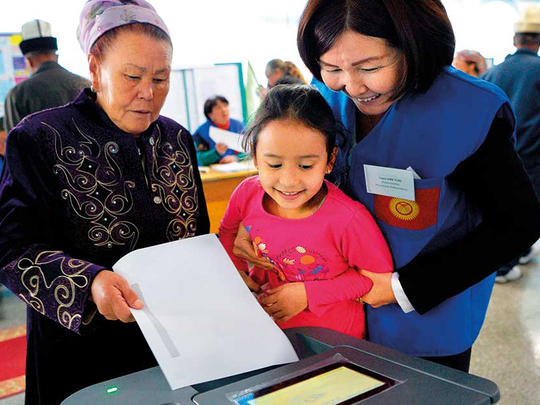
Bishkek: Kyrgyzstan began voting on Sunday in a presidential election with no candidate expected to win outright and observers predicting a close runoff between two pro-Russian candidates, one of whom is backed by the outgoing leader.
The mainly Muslim nation of 6 million people is already a close ally of Moscow and hosts a Russian military base, helping its former Soviet overlord project power across the region where China and the United States also vie for influence.
In contrast to its Central Asian neighbours, mostly run by autocrats, Kyrgyzstan is a boisterous democracy that produces sometimes chaotic changes of leadership.
After its first two presidents after the Soviet Union’s demise were ousted by violent riots, the country restyled itself as a parliamentary republic where presidential powers are mostly limited to foreign policy and security matters.
But outgoing president Almazbek Atambayev strengthened executive powers last year by calling a referendum on constitutional changes.
Also, alliances between parliamentary factions have been fluid, meaning a new leader could easily build a coalition around himself.
Constitutionally barred from seeking a second six-year term, Atambayev is backing an ally, former prime minister and experienced bureaucrat Sooronbai Jeenbekov, 58, whose victory would allow the outgoing leader to remain a powerful figure.
Atambayev and Jeenbekov’s Social Democratic party has the biggest faction in parliament and dominates the coalition cabinet.
But they face stiff opposition from oil tycoon Omurbek Babanov, 47, whose Respublika-Ata Zhurt (Fatherland) party has the second-biggest parliamentary faction and whose poll numbers suggest he and Jeenbekov will compete in a tight runoff.
Babanov, also a former prime minister, has accused the government of abusing its powers to ensure Jeenbekov’s victory after the authorities charged some of his campaign supporters with plotting a coup and planning to bribe voters.
Babanov has denied any wrongdoing and dismissed the charges against his supporters as dirty election tactics.
Atambayev and his cabinet have also accused Kazakhstan, a bigger and wealthier neighbour, of backing Babanov — which both Babanov and the Kazakh government deny.
“I am absolutely sure that tonight we will know the name of the new president and that name will be Babanov,” a smiling Babanov told reporters as he cast his ballot in Bishkek.
One of his supporters, Fatima Akchokoyeva, a 25-year-old kindergarten teacher, said: “He is young and ambitious, I think he will be able to change Kyrgyzstan for the better.” Jeenbekov’s voters, on the other hand, saw him as a safe pair of hands who would keep Atambayev’s team in place.
“I think he will be able to maintain stability. Stability is all we need,” said district government employee Saltanat Temirova, 58.
Despite their differences, both Jeenbekov and Babanov have said they considered Russia — where hundreds of thousands of Kyrgyz migrant labourers work — a strategic partner.
Polls close at 8pm (1400 GMT) and preliminary results may be published a few hours later. There is no set date for a second round, which takes place in the event that none of the 13 candidates wins more than 50 per cent of the vote.












